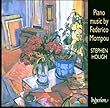American-born and trained (Juilliard, Manhattan School of Music) pianist Sara Davis Buechner gives an enlightening lecture-demonstration on the ubiquitous Beethoven Piano Sonata in C Minor, op. 13, known to every living organism as the "Pathetique" Sonata (and might I add, one of the few sonatas to which Beethoven attached a "nickname".)
EVERY PIANO STUDENT who loves the "Pathetique" (and who doesn't?) MUST watch this. She gives an enlightening talk about the origins of this sonata, and its connection to the Mozart Sonata in C Minor, K.457.
And speaking of "living organism", that might be an offbeat way to describe Buechner's playing. Intensely powerful, often athletic, everything she does is backed up by a tremendous, disciplined technique and total immersion in the style of the music being performed.
Her recordings of "byways in the piano repertoire", such as piano music by Rudolf Friml, Miklos Rozsa, and neglected American "lady composer" Dana Suesse, are enjoyable listening. Ms. Buechner has also edited some music for Dover, including a volume of the wonderful and neglected music of Russian composer Anton Arensky.
Let's take a look at her pedigree (cribbed from another website):
Education: Juilliard School of Music, NYC, diploma; Manhattan School of Music, doctorate in music.
New York University, faculty member; University of British Columbia, School of Music, assistant professor, 2003–.
Awards: Gold Medal, Gina Bachauer International Piano Competition, 1984; Bronze Medal, Tchaikovsky International Piano Competition, 1986; Deutsches Schallplatten Preis, for recording of piano concertos by Bernard Herrmann and Franz Waxmann, 1995.
YEP. a BRONZE medal in the TCHAIKOVSKY competition.
An abridged list of her recordings:
Piano Music of George Gershwin, Connoisseur Society, 1994.
Henry Martin: Preludes and Fugues, GM Recordings, 1994.
The Paradine Case: Hollywood Piano Concertos, Koch International Classics, 1995.
Bach-Busoni Goldberg Variations, Connoisseur Society, 1997.
Rózsa: Complete Works for Solo Piano, Koch International Classics, 1999.
Stephen Foster: Complete Piano Works, Pro Piano, 2002.
Piano Music of Rudolf Friml, Koch International Classics, 2004.
Joaquin Turina: Mujeres Españolas, Koch International Classics, 2004
SO... Why have we Americans so overlooked one of our own?
She was born David Buechner. That's why. Read more here.
Our loss is Canada's gain.
Americans are becoming more accepting of public figures who are gay, lesbian, or transgender. But it seems that the Classical Music world, even with its disproportionately large number of LGBT performers, listeners, and fans, are slow to accept its own.
Here is Sara's story, in her own words, from an article published last February.
Sara Davis Buecher has lived her life with dignity and courage. And she deserves our attention. And more bookings in her native land.




